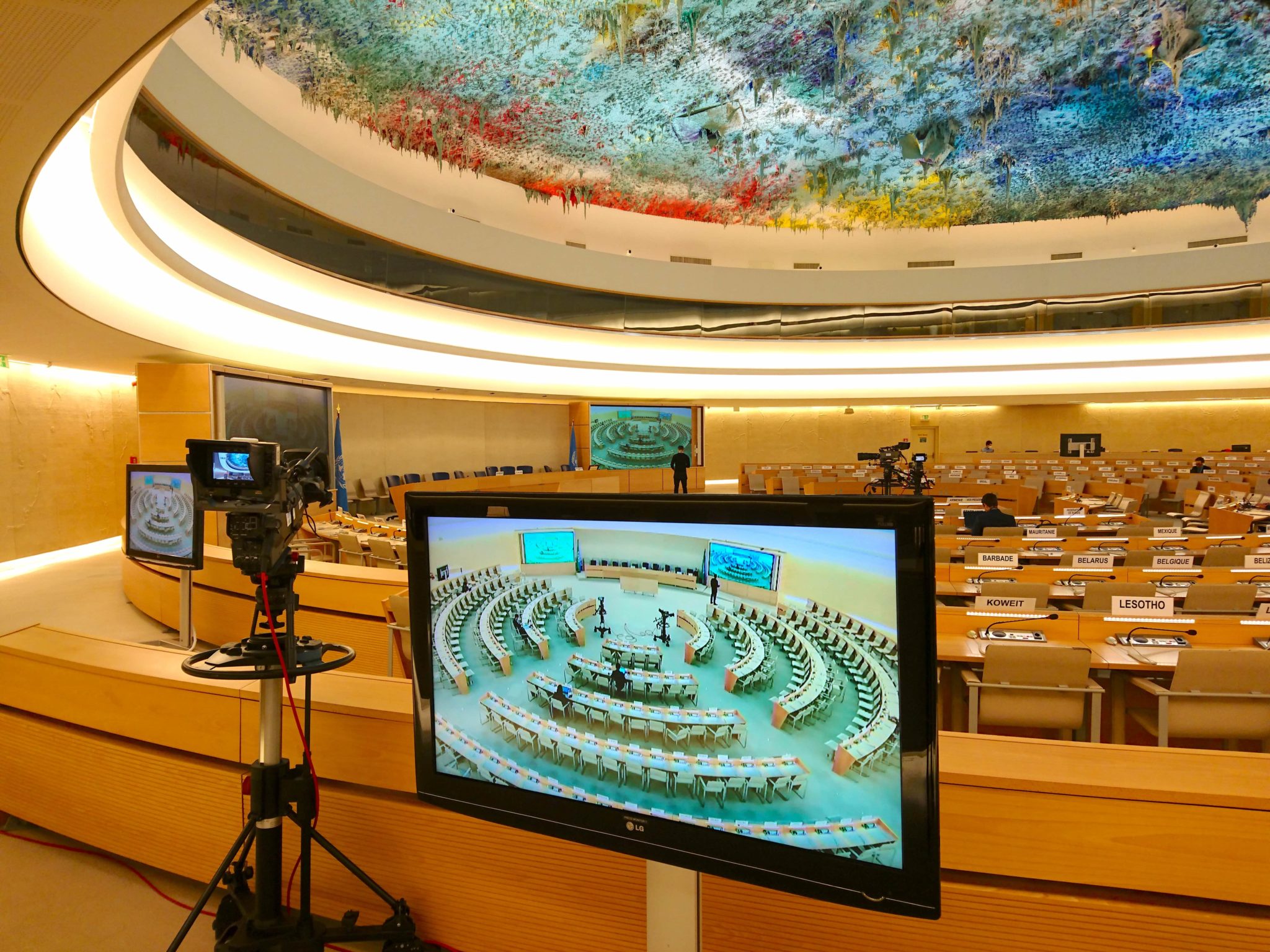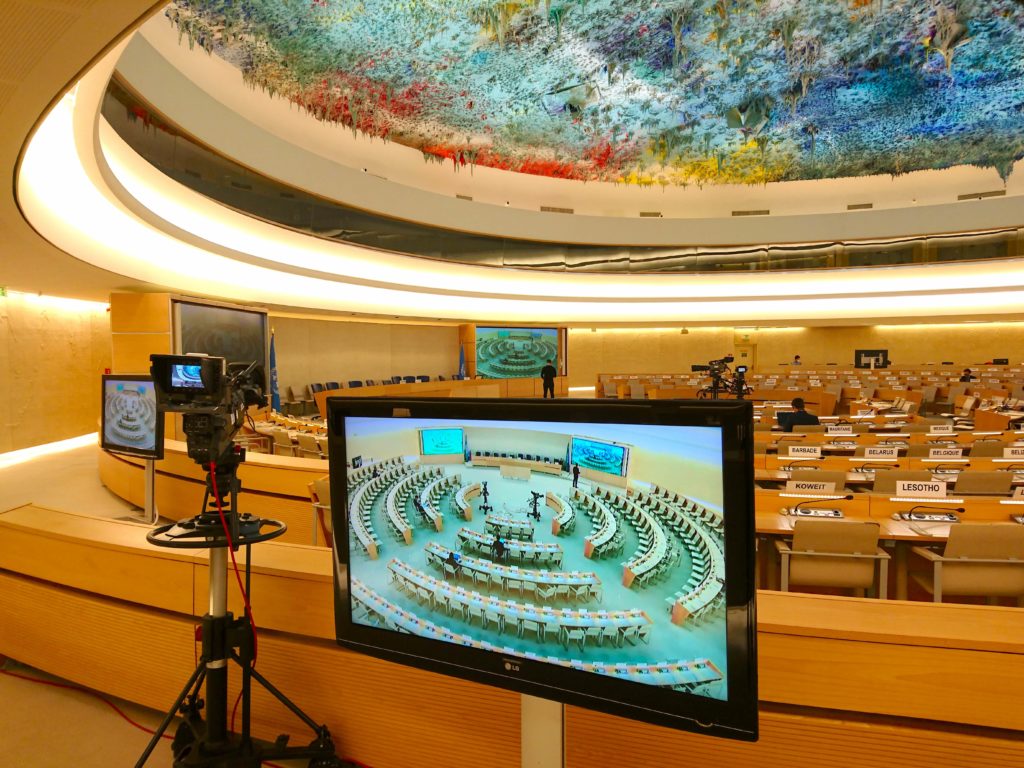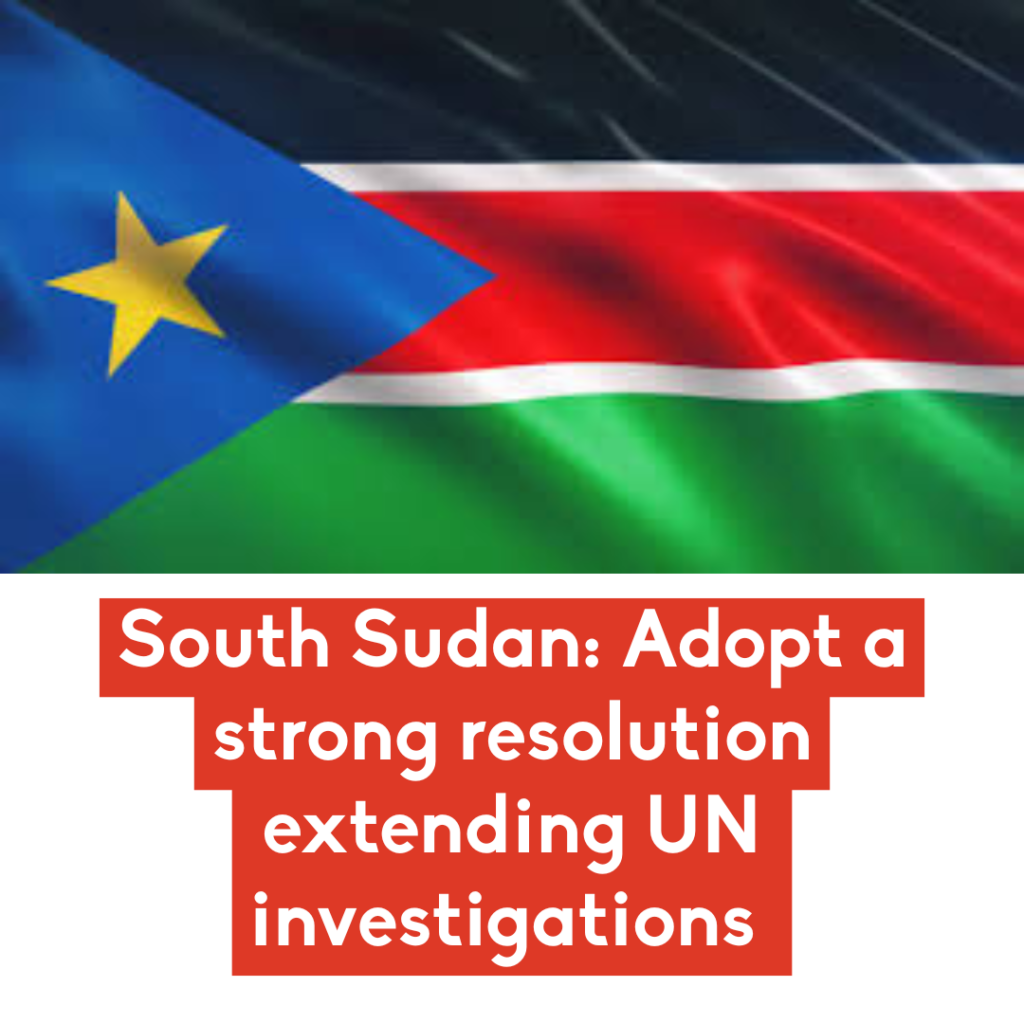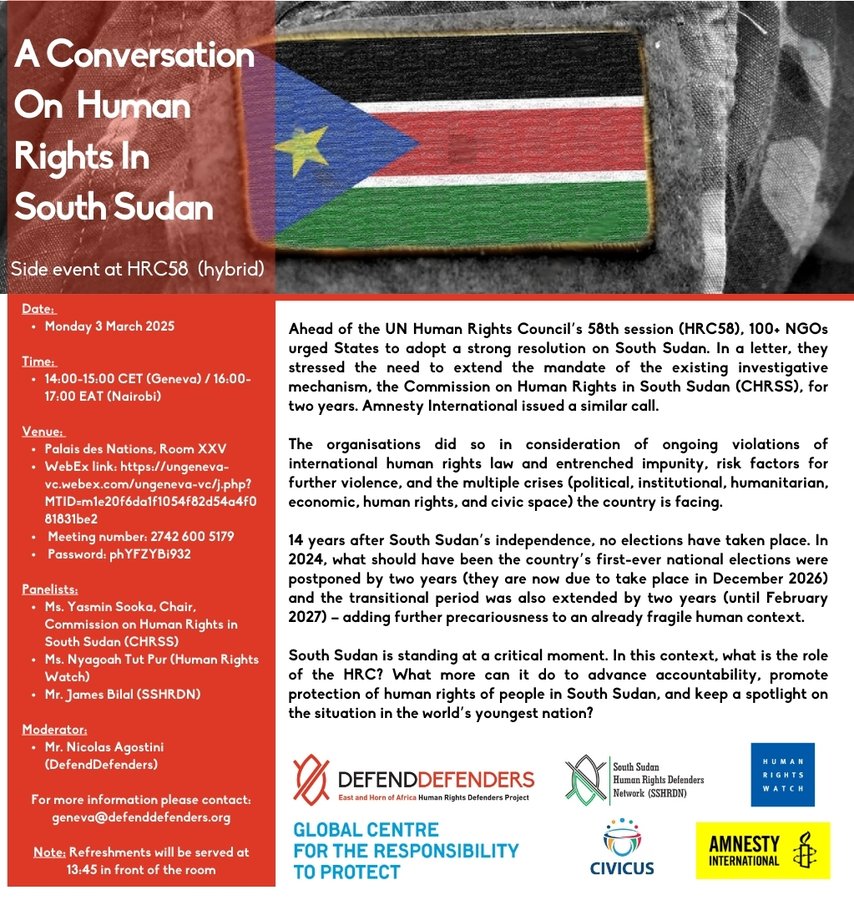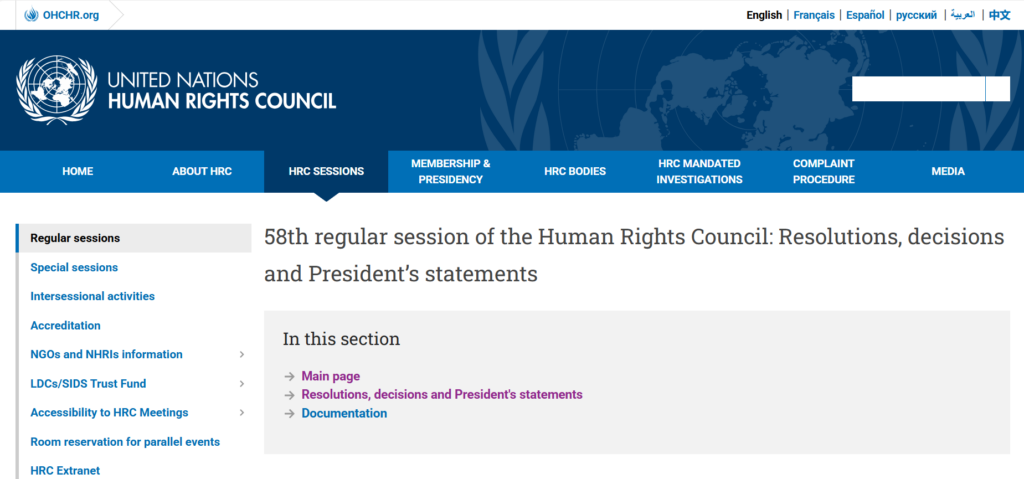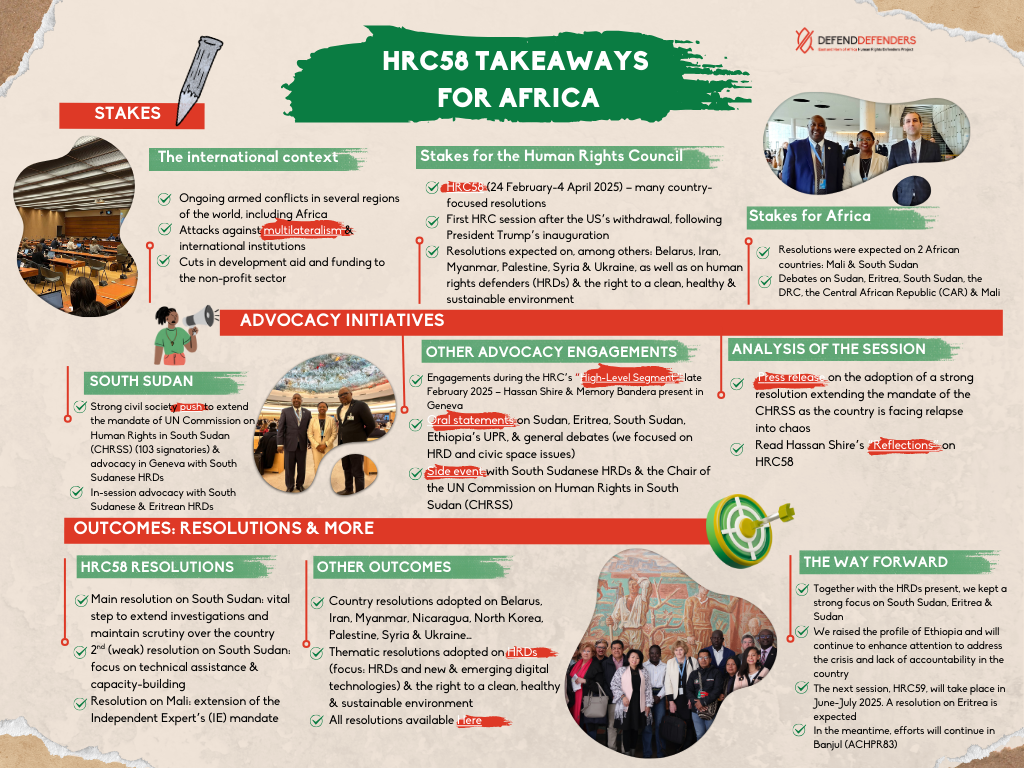The UN Human Rights Council’s (HRC) 58th session (HRC58, 24 February-4 April 2025) saw the adoption of over 30 resolutions, many of which addressed country crises. For Africa, March sessions are not the busiest (September sessions usually are, with resolutions on Burundi, Somalia and Sudan, among others).
HRC58 took place in a context of attacks against multilateralism and civil society. Among the first category, we can mention the US’s withdrawal from the HRC and other “UN family” institutions like the World Health Organization (WHO), following President Trump’s inauguration for a new term. (Unfortunately, Israel and Nicaragua followed suit, which means that two countries that are objects of HRC resolutions (the latter being a founding member of the UN) are now out of the UN’s top human rights body – they will not participate in its debates and proceedings.) Among the second category, we can mention funding cuts, as donor priorities are shifting. This was felt during the session, as fewer human rights defenders (HRDs) and organisations than usually were able to travel to Geneva and engage in advocacy.
We urge all states to re-commit to dialogue and multilateralism, stay in or re-join international organisations, and pay their membership dues to the UN. Multilateral institutions are the only way of addressing issues that are global or have transnational dimensions, from public health to international peace and security to human rights. They are irreplaceable.
South Sudan: the HRC contributes to peace and accountability efforts
For DefendDefenders, HRC58 started with the usual “High-Level Segment” (a week dedicated to speeches by state dignitaries), late February. Our team was active meeting with states and UN officials, as well as participating in plenary debates and side events. On 28 February, I was honoured to moderate an OHCHR-organised event on Sudan.
For the session, South Sudan was our primary focus. Weeks ahead, as usual, we drafted and coordinated the development of a joint civil society letter. This year’s letter, endorsed by 103 signatories, urged the HRC to adopt a strong resolution on the country. More precisely, it urged the extension of the mandate of the existing investigative mechanism, the UN Commission on Human Rights in South Sudan (CHRSS), for two years.
During the session, while the CHRSS presented its last report, we led advocacy with two South Sudanese HRDs, held meetings with state representatives and UN experts, and held a side event with HRDs and the Chairperson of the CHRSS, Yasmin Sooka.
The resolution adopted on 2 April at the initiative of core group (UK, Norway, Albania, Ireland) is strong and in line with civil society expectations. It enables the CHRSS to pursue its work for at least one year as South Sudan is facing a risk of relapse into chaos. Indeed, the country has been on the brink of relapse into large-scale civil war. Heavy fighting in several parts of the country and escalating tensions in Juba are threatening to nullify the 2018 revitalised peace agreement.
In a press release, we welcomed the Council’s move and urged it to stand ready to respond to any developments in South Sudan. The international community’s and the African Union’s eyes should be on South Sudan.
Enhancing scrutiny of Ethiopia
In Ethiopia, over a year after the HRC discontinued its investigative mechanism, ICHREE, things are not going well. Violence is spreading across several regions of the country, independent actors (including civil society and HRDs) are under attack, and a flawed transitional justice process is failing victims and survivors of the conflict in Northern Ethiopia. These developments led CIVICUS to downgrade Ethiopia from “Repressed” to “Closed,” its worst Civic Space Monitor rating.
In light of this situation, we enhanced our advocacy. In a statement under item 4 general debate (dedicated to the most serious situations worldwide), we called on states to bring Ethiopia back to the Council’s agenda, through a resolution.
We also delivered a statement for the adoption of the Universal Periodic Review (UPR) outcome on the country.
We welcome states’ collective action, which will hopefully pave the way for more robust action, in the form of a joint statement endorsed by the EU and a dozen more states.
HRDs: substantive resolution adopted
As every three years, the HRC adopted a substantive resolution on HRDs, at the initiative of Norway. This year’s text, supported by many NGOs, addresses a new topic: HRDs and new and emerging technologies. The resolution covers new grounds, addressing states’ obligations to protect HRDs in the digital age and in online spaces.
At a critical time, as HRDs and civil society actors are facing attacks in multiple forms, the international community must re-commit to the protection of HRDs. This includes the digital sphere, where HRDs both can benefit from new and emerging technologies and be subjected to new risks and threats, including undue surveillance and online attacks.
Keeping a spotlight on protracted crises
HRC58, which spanned over six weeks, was also an opportunity to maintain attention to protracted crises, in Africa and elsewhere. The Council adopted resolutions addressing human rights violations in, among others, Belarus, Haiti, Iran, Mali, Myanmar, Palestine, Syria, or Ukraine.
The Council held debates on Eritrea (during which we stressed that the regime was unable to use its HRC membership (2019-2024) to evade scrutiny, and raised the alarm over mobilization and military re-training); Sudan (during which, following the High Commissioner, we urged the international community to re-prioritise the country to prevent more atrocities, more suffering, and dislocation), and South Sudan – Memory Bandera, our Head of Programmes and Administration, delivered our statement.
Other debates, like the general debate under item 2 (which follows the High Commissioner’s update to the Council), were opportunities to raise trends and patterns. We did so by stressing the role of HRDs and organisations, including regarding alert systems & conflict prevention, and by raising concern over Cameroon, Kenya, the eastern DRC and Burundi, where journalist Sandra Muhoza remains arbirarily detained.
Next steps for our advocacy
The Council’s 59th session (HRC59) will take place from 16 June to 11 July 2025. As all June sessions, unfortunately, it will not have “general debates.” With civil society partners, we have repeatedly called for the reinstatement of these general debates, which are important opportunities for civil society to raise situations that are not on the Council’s agenda but should be.
For us, HRC59 will have a focus on Eritrea. We will seek to maintain scrutiny of the country’s appalling human rights situation. We will also engage with the Fact-Finding Mission (FFM) for Sudan.
In the meantime, we will participate in the 83rd session of the African Commission on Human and Peoples’ Rights (ACHPR) in Banjul, The Gambia, with a view to pushing Africa’s top human rights body to deliver meaningful resolutions and cross-fertilising outcomes of the ACHPR and of the HRC. Everyone gains when Africa’s and the UN’s foremost human rights bodies are on the same page and speak with a strong voice against violations and injustice.
Hassan Shire
Executive Director , DefendDefenders & Chairperson, AfricanDefender
Oral statements to the Council
Advocacy documents and press releases
Side Events
Outcomes: Resolutions
South Sudan
Mali
HRDs

